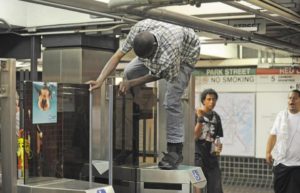
Turnstile jumper. (Image credit: Boston globe.)
The Metropolitan Washington Area Transit Authority (MWATA) has a big revenue problem. Not only is ridership declining, but it appears that an increasing number of riders aren’t paying their fares. To recapture riders, Metro is asking billions of dollars from member states and localities to patch up everything from rail lines to escalators. And to plug its revenue losses from fare jumpers, the authority is cracking down on fare evasion.
Metro Transit Police Chief Ronald A. Pavlik Jr. estimated that the agency loses up to $25 million a year in unpaid fares, reports the Washington Post. From January to June of this year, the number of fare-evasion citations issued more than doubled from the year before to about 6,000 tickets. About 65 percent of those tickets were issued to rail users; 8 percent of the tickets resulted in an arrest. Metro doesn’t collect any money from the fines, but it will benefit if tougher enforcement reduces turnstile jumping.
Many people applaud the crackdown on cheaters. WMATA desperately needs the money to maintain the rail service, which has been plagued with safety issues and delays. Metro General Manager Paul J. Wiedenfield has said that people feel a sense of injustice that some riders flout the rules and ride for free while others dig deep to pay their fares. “I think it’s right that everybody pay their fare.”
But not everyone agrees.
Washington City Council is considering legislation that would decriminalize fare evasion, eliminate jail time, and lower the maximum possible fine from $300 to $100. The move, says the Washington Post, “mirrors a trend in cities across the country based on a growing awareness among lawmakers of how issues such as legacy policing practices, unconscious bias and systemic racism, can unfairly target communities based on race or age — even in the seemingly mundane case of fare jumping.”
Some legislators are questioning whether fare evasion should be a crime at all, arguing that targeted enforcement campaigns are bound to ensnare poor and low-income people who don’t have the money to pay their fares — let alone fines.
“Absolutely there’s been a raised consciousness on this that did not exist 20 or 30 years ago,” said Nassim Moshiree, policy director at the American Civil Liberties Union of the District of Columbia. “Activism like the Movement for Black Lives has had a positive impact on raising awareness that policing — and the explicit and implicit bias in policing — means that certain communities are impacted in unfair ways. Even when it comes to something like fare evasion.”
Bacon’s bottom line: The MWATA board already keeps fares artificially low out of concern for the impact on low-income riders, with the difference to be made up by state and local governments. These low fares, incidentally, are a big reason why the system is desperate financial straits today. But apparently, that’s not enough. Now, invoking vague charges of systemic racism — no one has made the case that Metro is systemically racist, just that systemic racism exists — they want to end the crackdown on fare jumping.
It is thinking like this that puts the ACLU, Black Lives Matter, and allied movements in such ill repute. The mere fact that “systemic racism” exists somewhere in the country becomes grounds for engaging in what might be called “systemic reverse racism” in which one group, Metro fare jumpers who are predominantly African-American, get off easy while shifting the cost to taxpayers, a group dominated by whites. (Actually, MWATA does not track the racial identity of fare jumpers. I am simply following the lead of the ACLU’s Mr. Moshiree, whose statements would make no sense if he did not believe that fare jumpers were mainly African-American.)
This is identity politics run amok, and it is becoming all-pervasive in our society. And the most evil, insidious part of it is this: The more that blacks embrace identity politics, the more many whites will as well — particularly lower-income whites whose lives belie the notion that they benefit from “white privilege.” And that’s how you end up with Donald Trump.
Martin Luther King had a dream that one day people would be judged by the content of their character, not the color of that skin. Tragically, that dream seems to be dying.


